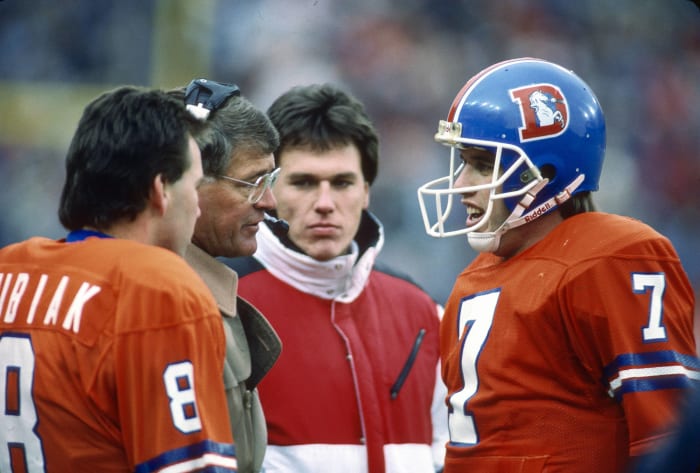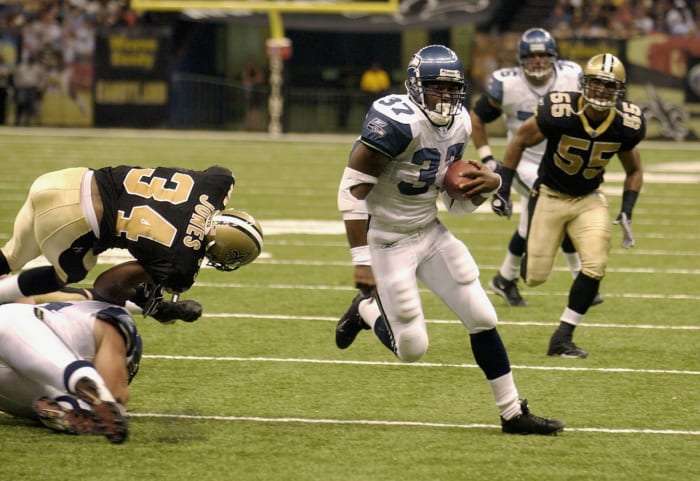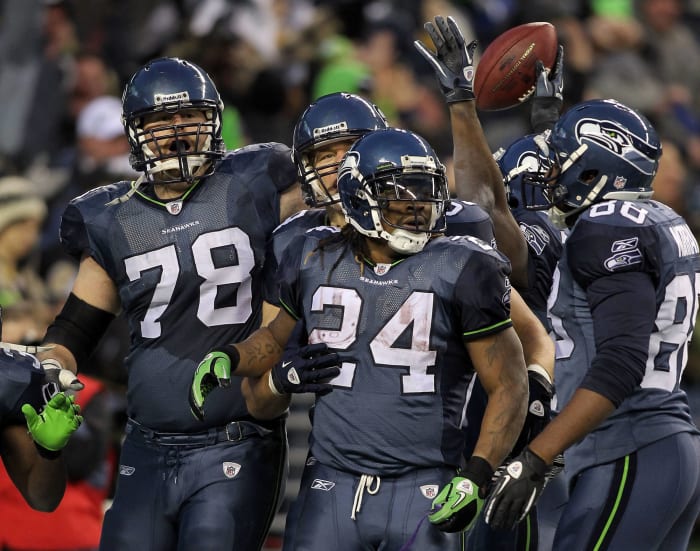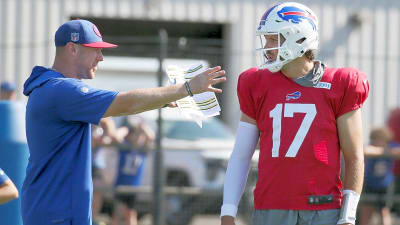The NFL's best teams are obviously frequent talking points, but what about the worst ones to be granted playoff access? Here is a look at the worst teams to qualify for the postseason since the NFL expanded to five-team brackets in 1978. (Note: The 1982 strike-shortened season, which featured eight-team fields, is excluded.)
Focus on Sport/Getty Images
Months after John Elway refused to play for the Colts, he slogged through a tough rookie year. The all-time great threw seven touchdown passes compared to 14 picks for the 1983 Broncos, but they still managed a 9-7 record. Journeyman Steve DeBerg helped shepherd this, going 4-1 in his starts. Bronco greats Randy Gradishar and Louis Wright led a top-10 defense en route to the Pro Bowl. The Seahawks trounced the Broncos 31-7 in the AFC's wild-card game, though Elway's team rebounded to win the AFC West four times in the next six years.
Helen H. Richardson/Getty Images
Save for perhaps Kelly Clarkson or Vince Vaughn, Vince Young enjoyed a better mid-2000s than just about anyone. He led Texas to the 2005 national title and won Offensive Rookie of the Year honors in '06. In 2007, Young's descent began, despite the Titans going 10-6. Norm Chow's offense ranked 22nd, and Young threw nine touchdown passes and 17 INTs. A Week 17 win over a Colts team resting Peyton Manning lifted the Titans to the playoffs, but they scored six points in a rainy Round 1 loss in San Diego. Kerry Collins replaced Young in 2008 and helped Tennessee to the AFC's No. 1 seed.
Jeff Kowalsky/Getty Images
Barry Sanders retired before the season, but the Lions stayed the course for a bit. Detroit's ground game struggled, but Germane Crowell and Johnnie Morton posted 1,000-yard receiving seasons. This team beat five NFC playoff entrants, including the Buccaneers and Super Bowl champion Rams, and still went 8-8. Gus Frerotte relieved an injured Charlie Batch in two comeback wins, the second over St. Louis, but Detroit lost its final four games and trailed 27-0 in a wild-card defeat in Washington. The Lions unraveled two years later, starting 0-12, and did not return to the playoffs until 2011.
David Bergman/Miami Herald/TNS via Getty Images
The Dolphins made the playoffs from 1997-2000, enduring one-sided eliminations each year. The 1999 team endured the roughest exit. Despite Zach Thomas and Sam Madison earning All-Pro acclaim, Miami lost five of its final six but qualified for postseason play at 9-7. Dan Marino's final season was his worst (12 TD passes in 11 games, to go with 17 INTs), but the Miami icon managed to steer his team to a 17-10 wild-card win in Seattle. The 14-2 Jaguars squashed that momentum with a 62-7 divisional-round demolition. This was both Marino's and Jimmy Johnson's final NFL game.
5 of 25
21. 2017 Tennessee Titans
David Butler II/USA TODAY Sports
The Patriots sure caught some fortunate divisional-round opposition in the 2010s. Tennessee (9-7, No. 18 DVOA) needed overtime to beat 0-16 Cleveland, lost by at least 23 points twice — including a 57-14 bashing in Houston — and sported neither an upper-echelon offense nor defense. The Titans did sweep the Jaguars and upset the Chiefs on an 18-point comeback (after the home team lost Travis Kelce and Chris Jones during the game) in Round 1. But the Titans' season, featuring a Marcus Mariota regression and ending with the Pats' 35-14 rout, led to Mike Mularkey's firing — not traits of a good playoff team.
Focus on Sport/Getty Images
Bud Grant led four Vikings Super Bowl teams and coached in the playoffs 12 times in a 15-year span. The Hall of Fame coach's 1980 team was a cut below Minnesota's usual quality, going 9-7 and requiring an Ahmad Rashad Hail Mary grab to secure the NFC Central title and a playoff spot. Tommy Kramer threw for over 3,500 yards, and Rashad made the Pro Bowl with 1,095 receiving. Minnesota lost five games by double figures, four to non-playoff opposition, before dropping the NFC wild-card game 31-16 in Philadelphia.
Focus on Sport/Getty Images
In a bad AFC year, two AFC Central teams qualified after being collectively outscored by at least 40 points. The Bengals and Oilers swept the 9-7 Steelers (minus-61), and the Browns beat them 51-0 on opening day. But Pittsburgh, quarterbacked by Bubby Brister and featuring future Hall of Fame cornerback Rod Woodson, won five of its final six to reach the playoffs and upended Houston in an overtime wild-card win. The Steelers then put a scare into the eventual AFC champion Broncos, but two second-half turnovers proved costly in a one-point loss. This was the last charge for the Chuck Noll era, which ended two years later.
George Gojkovich/Getty Images
Bernie Kosar became a quality quarterback in Cleveland. He was not there yet as a rookie. The Browns turned to the Ohio native midway through 1985, after a Gary Danielson injury, but soon lost four straight. However, the AFC Central was historically bad that year. No other team won more than seven games, so the Browns' 8-8 record was enough. Kevin Mack and Earnest Byner powered the team, each surpassing 1,000 rushing yards. Byner's big day (161 yards, two TDs) had the Browns up 18 points in the divisional playoffs, but the Dolphins rallied to win. It was an unfortunate precursor to Cleveland's immediate future.
Bettman/Getty Images
In 1977, the Falcons threw the "Grits Blitz" at the NFL, setting the record for points allowed in a 14-game season (9.2 per game). In 1978, rule changes unshackled pass offenses, minimizing the Falcons' all-out attacking defense. The '78 team (9-7) allowed nearly twice as many points per game (18.1) and deployed the NFL's third-worst offense. Despite a five-game midseason win streak, Atlanta finished with a minus-50 point differential. That said, the Falcons beat the Eagles in the wild-card round, thanks to some shaky Philly kicking, and held a second-half lead in a loss to the NFC champion Cowboys.
Jamie Squire/Getty Images
The first of the Bengals' five 2010s playoff appearances went 9-7. This was the initial Andy Dalton-A.J. Green season, and the latter made the first of his seven straight Pro Bowls as a rookie. Cedric Benson also exceeded 1,000 rushing yards. The team traded Carson Palmer midseason after he'd threatened to retire in protest of further Bengals employment. Cincinnati beat no playoff teams this season and lost 31-10 to the Texans in the wild-card round, with Dalton throwing three interceptions. Each of the Bengals' ensuing playoff journeys featured 10-plus-win regular seasons.
11 of 25
15. 1989 Houston Oilers
Focus on Sport/Getty Images
Warren Moon's Oilers made seven straight playoff berths from 1987-93 but changed coaches after the '89 season, canning Jerry Glanville after he'd turned the team around. Houston's aggressive (often labeled dirty) defense ranked 26th in 1989 and gave up 61 points to the Bengals in a December game in which Sam Wyche ran up the score on rival Glanville. Despite the Oilers (minus-47) losing their last two, they made the playoffs at 9-7 and hosted the AFC wild-card game. The Steelers' comeback win sent Glanville to Atlanta. Jack Pardee took over the Oilers in 1990, turbocharging the offense with his Run and Shoot attack.
Focus on Sport/Getty Images
John McKay and Doug Williams lifted the Buccaneers to respectability for a period, but a descent was coming. The '81 team delayed it, going 9-7 to power the Bucs to the playoffs for the second time in three years. These Bucs beat no winning teams and lost five games by double figures (four of which to non-playoff-bound squads). Wideout Kevin House (1,176 yards, nine TDs) and Pro Bowl tight end Jimmie Giles fared well, as did Tampa Bay's No. 4-ranked defense. That mattered little in a 38-0 wild-card loss in Dallas. The Bucs did not make a non-strike-year playoff field again until 1997.
Troy Taormina/USA TODAY Sports
Brock Osweiler helped the 2015 Broncos win a Super Bowl, but they did not outduel the Texans in free agency. That backfired royally on the winning bidders. Signing Osweiler to a four-year, $72 million contract, the long-QB-starved Texans received worse production and entered the playoffs with the No. 29 offense. The AFC South's by-default champion went 9-7, with a minus-49 differential, and managed to beat a Raiders team missing its top two QBs in Round 1. Despite a decent showing from a sans-J.J. Watt No. 1-ranked defense, the Texans predictably struggled on offense in a divisional-round loss to the Patriots.
14 of 25
12. 2022 Tampa Bay Buccaneers
Nathan Ray Seebeck-USA TODAY Sports
Limping into the playoffs due to winning a one of the worst divisions in NFL history, the Bucs did the bare minimum. Tom Brady unretired, and Tampa Bay brought back impact free agents Ryan Jensen and Carlton Davis and added other veterans for a last ride of sorts. Brady's interior O-line exiting the picture -- via retirement, free agency and Jensen's injury -- doomed the team, which fell from second to 25th offensively and ranked last on the ground. Brady-led comebacks over the Rams and Saints prevented a 10-loss season, but the all-time great still showed clear regression. The Cowboys put the Bucs out of their misery in the wild-card round.
15 of 25
11. 2015 Washington
Geoff Burke/USA TODAY Sports
Receiving one of this era's most favorable schedule draws, Washington faced just two playoff teams in the regular season. While both the Panthers and Patriots routed Washington, the team still went 9-7 to win a weak NFC East. Kirk Cousins' breakout (29 touchdown passes, a No. 6 QBR ranking) produced a strong second half, but Washington ranked 17th defensively and beat no team with a winning record. The Packers eliminated the NFC East champs fairly easily. Washington blew a win-and-in opportunity in Week 17 a year later and then went through a messy Cousins divorce.
16 of 25
10. 2004 St. Louis Rams
Jed Jacobsohn/Getty Images
The end of the "Greatest Show on Turf" era produced a playoff win, but these Rams were fortunate to have qualified at 8-8. Football Outsiders placed Mike Martz's team 30th in DVOA that year. The Rams lost six games (seven, if you count their divisional-round defeat in Atlanta) by at least 17 points and finished with a minus-73 differential. However, they did have one key team's number, beating the Seahawks three times — the third in a 23-20 wild-card win in Seattle. The Marc Bulger-Torry Holt-Isaac Bruce attack was humming, with both wideouts eclipsing 1,250 yards. This was also Marshall Faulk's final season as a starter.
Chris Graythen/Getty Images
Following the Rams' mid-2000s descent, the Seahawks gained control in the NFC West, winning four straight division titles. But there was not much competition for Seattle, which went 9-7 in '04. The Seahawks (minus-2) enjoyed a better regular season than the Rams, beating two teams with winning records (though, the Falcons were not going all out in Week 17). But they reside beneath them here because of the three head-to-head losses. Shaun Alexander did have a monster season (1,686 rushing yards, 18 TDs), however, and enjoyed a better one for the '05 team that became NFC champion.
Rich Barnes/USA TODAY Sports
Nathan Peterman's infamous five-INT start in Los Angeles revealed apparent Bills playoff apathy during Sean McDermott's first season, but late-game Andy Dalton heroics in Week 17 allowed Buffalo entry anyway. The 9-7 team (minus-57, 21st DVOA) qualified in a bad year for AFC depth, but Buffalo's 2018 offseason actions — trading Tyrod Taylor to start what turned out to be a quick rebuild — indicated team brass viewed the 2017 run as fluky. Still, the Bills snapped major North American sports' longest active playoff drought (17 years) and beat the Chiefs and Falcons before losing to the Jaguars in a close, and aesthetically brutal, wild-card game.
19 of 25
7. 2011 Denver Broncos
Justin Edmonds/Getty Images
This will befuddle future generations. A quarterback completed 46.5% of his passes on a team with the No. 24 defense. Playoffs? In 2011, Tim Tebow (and some timely defensive stops from a unit with three Hall of Fame talents: Champ Bailey, Brian Dawkins and rookie Von Miller) galvanized the Broncos. Kyle Orton had them 1-4; Tebow piloted six straight wins after offensive coordinator Mike McCoy Tebow-ized the offense. Denver lost its final three, then, this . Demaryius Thomas posted 204 yards in the wild-card win. In Round 2, the Patriots routed the Broncos. John Elway soon ended the short but unforgettable Tebow era.
20 of 25
6. 2020 Chicago Bears
Dennis Wierzbicki-USA TODAY Sports
While the AFC featured a riveting race that ended with its No. 7 seed at 11-5, the NFL's expansion to 14 playoff teams will continue to permit underwhelming teams postseason access. The 8-8 Bears made the playoffs after a six-game midseason losing streak, which included a switch from Nick Foles back to a previously benched Mitch Trubisky. The Bears notched one victory against an over-.500 team. Chicago, which did sport a top-10 DVOA defense, beat three shaky teams down the stretch to make the playoffs. But the NFL's 26th-ranked offense compiled 140 pre-garbage-time yards in a one-sided playoff loss in New Orleans.
Bill Greene/The Boston Globe via Getty Images
This 8-8 season interrupted what would have been a 12-year Jets playoff drought. This was the end of Ken O'Brien's eight-year run as the Jets' starter; the former first-rounder (selected ahead of Dan Marino) threw just 10 touchdown passes in 16 starts. New York beat no playoff teams and benefited from the AFC lacking depth. The Jets endured two three-game losing streaks and crept into the playoffs via a Week 17 overtime win in Miami. The Oilers eliminated the Jets in the wild-card round. Three head coaches were fired before the team returned to the playoffs under Bill Parcells in 1998.
22 of 25
4. 2010 Seattle Seahawks
Jonathan Ferrey/Getty Images
Beastquake did occur, but it is impossible to exclude a 7-9 team from the upper reaches of this list. Kurt Warner's Arizona rise interrupted Seattle's string of NFC West titles, but the 2010 Seahawks reclaimed supremacy — despite winning their seventh game in Week 17 — after the Hall of Famer's retirement. Seattle (minus-97) ranked 23rd on offense and 25th defensively in Pete Carroll's first year. Earl Thomas was the only Legion of Boomer there yet. Still, Matt Hasselbeck's four TD passes and midseason trade acquisition Marshawn Lynch's historic run downed the defending champion Saints, prior to a loss in Chicago. This marked the start of a storied Seattle rise.
23 of 25
3. 2016 Detroit Lions
Steven Bisig/USA TODAY Sports
A sneaky-terrible playoff team, these Lions lost their final three games but still qualified at 9-7. Football Outsiders' DVOA metric ranked this group as 2016's sixth-worst team. The first post-Megatron year did not drag down Matthew Stafford too much, but these Lions featured a historically horrendous running game. Detroit ranked 30th in rushing; pass-down specialist Theo Riddick led the way with 357 yards. The Lions won five straight midseason but finished their year without beating one playoff team. They were overmatched in a wild-card loss in Seattle.
Bob Donnan/USA TODAY Sports
An NFL team once went two months without winning a game and still made the playoffs. The 2014 Panthers beat the Bears on Oct. 5 and tied the Bengals before losing six straight, leaving them 3-8-1 on Dec. 6. Thanks to a four-game win streak (and a terrible division), Carolina (19th on offense, 21st defensively) hosted a playoff game and won it. Of course, the Cardinals were on their third quarterback, Ryan Lindley, by then to set up one of the worst playoff matchups in NFL history. The Seahawks eliminated the Panthers, but Carolina won 17 of its next 18 games en route to Super Bowl 50.
25 of 25
1. 2020 Washington
Geoff Burke-USA TODAY Sports
In a cataclysmic NFC East season, Washington started 2-7 after former first-round pick Dwayne Haskins showed little development as a pro. Thanks to Alex Smith, DVOA's No. 3 defense and a division that saw Dak Prescott go down and Carson Wentz regress to the point it fractured the Eagles organization, Washington advanced to the playoffs at 7-9. However, Doug Pederson's decision to yank rookie Jalen Hurts for fifth-year QB3 Nate Sudfeld in a winnable Week 17 game will be attached to Washington's playoff trip — even if the Taylor Heinicke-quarterbacked team did account itself well against the Buccaneers in Round 1.
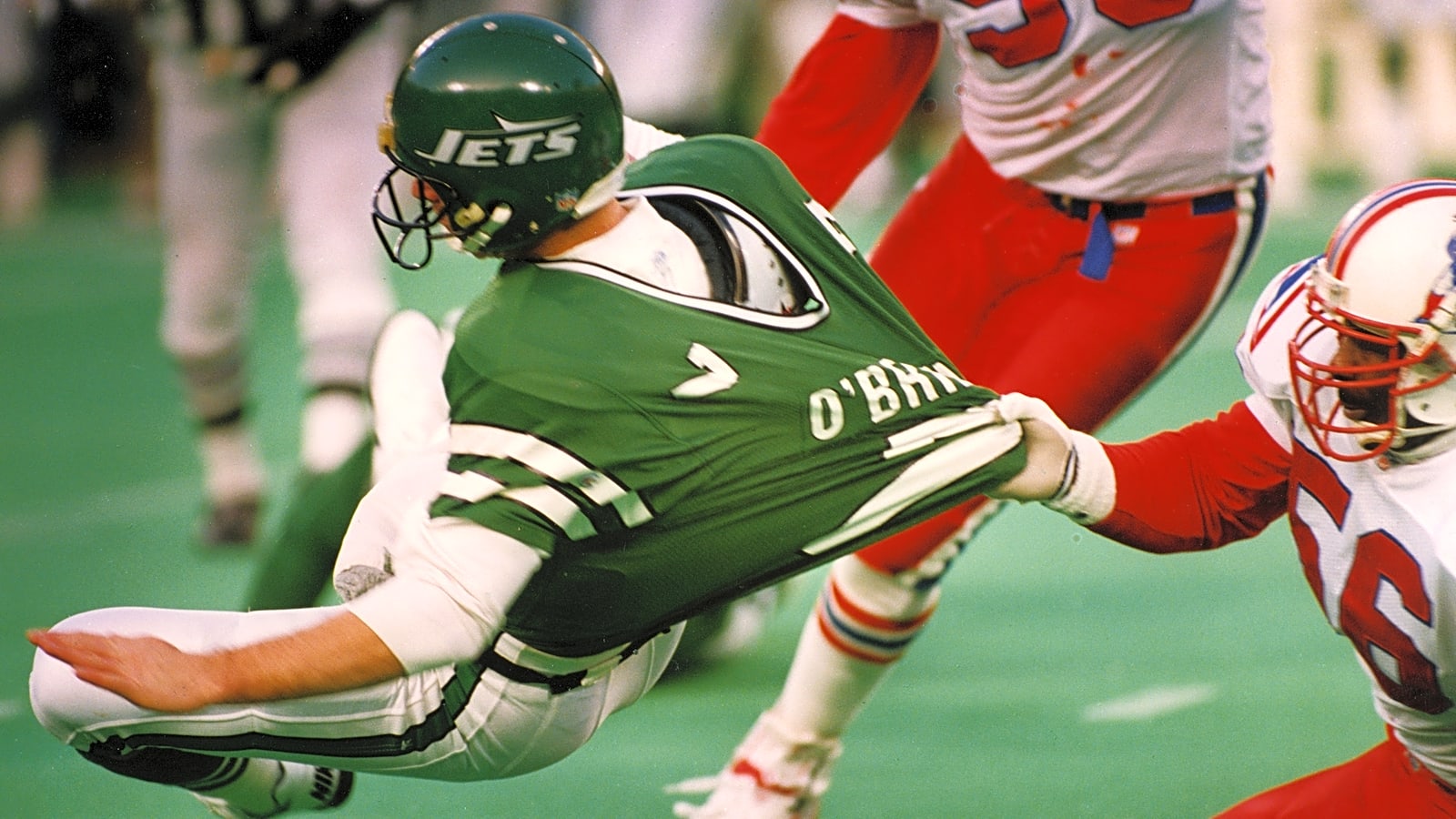
 +
+
